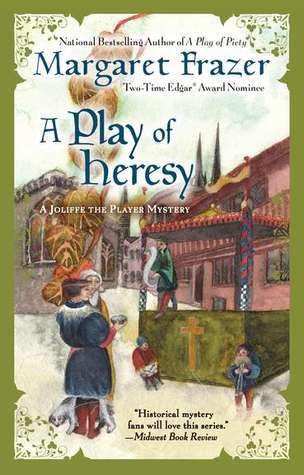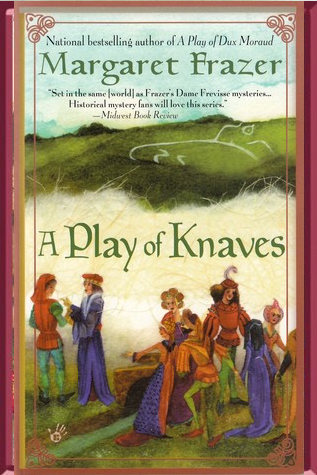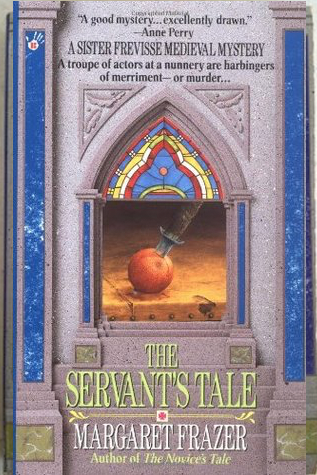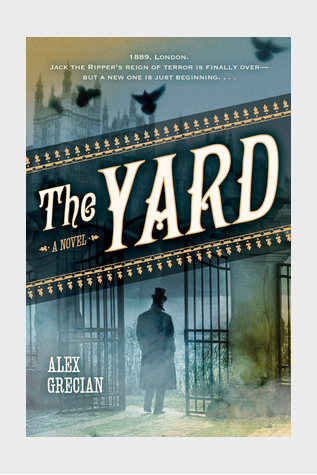I received this book for free from the library in exchange for an honest review. This does not affect my opinion of the book or the content of my review.
Source: the library
The Bastard's Tale
by
Margaret Frazer
historical mystery in a paperback edition that was published by Berkley on December 2, 2003 and has 320 pages.
Explore it on Goodreads or Amazon
Other books by this author which I have reviewed include A Play of Knaves, A Play of Lords, A Play of Treachery, A Play of Piety, Murder Most Medieval: Noble Tales of Ignoble Demises, A Play of HeresyCoventry, Easter, plays, murder, spies, guilds, mercer, jealousy, Judas, theater, directing, acting, suicide, costumes, religious plays,, The Novice's Tale, The Servant's Tale, The Outlaw's Tale, The Bishop's Tale, The Murderer's Tale, The Boy's Tale, The Prioress' Tale, The Maiden's Tale, The Squire's Tale, Clerk's Tale, The Hunter's Tale, The Widow's Tale
Twelfth in the Sister Frevisse medieval mystery series and revolving around Dame Frevisse, a Benedictine nun, and Joliffe, a player-writer turned spy for the bishop. Events take place in Bury St. Edmunds in England in 1447.
If you’re following the Sister Frevisse stories (and if you enjoyed her Joliffe, the Player series), you must read this one as events in this affect Frevisse and her relationship with Alice and Bishop Beaufort. Joliffe also plays in this.
My Take
It’s not a typical Frevisse, for there’s only the one bit of detecting — and Frevisse does have help from Joliffe and Pecock. Even Beaufort is stepping out of his usual role!
This story does make me grateful for the Internet and a justice system with rules and regulations. Yes, those rules can get put aside — hello NSA, CIA, FBI — but it’s more than Gloucester had back in 1447. Jesus.
This is a sad tale with no happily-ever-after for anyone. It’s mostly a tale of greed, but a greed for power, not money with actions that destroy families. Yes, there are politics involved, but no real discussion of strategy or true affairs of state. The best is simply mentions of Suffolk’s influence on the king and how Suffolk’s ego is affecting his relationship with Alice. I can’t imagine future installments without Alice, so it will be interesting to see how Frazer resolves this.
My favorite part is the play Wilde is putting on. It’s a brilliant-sounding piece, and I do wish I could have been there. Joliffe is his usual witty self even as he’s flying about, trying to do what he can for the bishop.
There’s a mention of Chaucer’s translation of Boethius’ Consolation of Philosophy, Boece, and it sounds like an interesting read. One to pick up, read a few pages, and think about it before continuing for another few. I very much appreciated Pecock’s assessment of confession and penance. Such a very realistic viewpoint.
The best of The Bastard’s Tale is the why of all these people helping Arteys who’s between a rock and a hard place; there are none of whom he would have expected to find aid. It’s too bad there aren’t more people willing to step up this way. Luckily, he does make good choices under the circumstances. Now if only Gloucester had been a bit more suspicious and Henry paying more attention…
The Story
Lured by the promise of his beloved wife’s pardon, the out-of-favor Gloucester travels to Bury St. Edmunds where Parliament has been moved. And so gather the spies of lords and bishops.
The Characters
Dame Frevisse is a Benedictine nun at St. Frideswide with the Lady Alice of Suffolk her cousin. Suffolk has the king’s ear and believes himself his equal. John de la Pole is the four-year-old Suffolk son and heir with his own part to play. Domina Elisabeth is still the prioress, and she sends Frevisse and Dame Perpetua as companion at the request of Henry Beaufort, Cardinal and Bishop of Winchester to spy for him in Bury. It’s Sister Amicia who accompanies Frevisse back to London.
Arteys is the bastard son of the Duke of Gloucester with no sense of his place or future. Humphrey, the Duke of Gloucester, is, until Henry has an heir, the heir to the throne of England with the Duke of York behind him. Gloucester’s men include Sir Richard Middleton, Gryffydd ap Nicholas, Sir Roger Chamberlain, Yevan ap Jankyn, Jenkin ap Rhys, Master Richard Needham who is the member of Parliament for Dover and employed by Gloucester, Tom Herbert, Hal, Sir John Cheney, and Sir Robert Wer. Gloucester’s wife, the Lady Eleanor, has been imprisoned for the past five years for witchcraft.
Master Wilde is producing a play to present to the king as a gift from Abbot Babington. Wilde’s wife, Joane, puts Frevisse to work hemming costumes. His son, Giles, has a part. John Lydgate is a Benedictine monk pushing to impose his taste upon the company.
Master Noreys, a.k.a., Joliffe, is the Devil in so many ways. /p>
Master Grene is the warden of St. Saviour’s where Gloucester will stay along with the king. Bishop Pecock of St. Asaph is a minor religious figure with a quick intellect. Runman is his servant, and Master Orle is his chaplain. Both are willing to do whatever the bishop needs. Brother Adam is in charge of the library and is forced to allow Dame Perpetua in.
Isabella Tresham‘s husband, William, is Speaker for the Commons in Parliament.
King Henry VI and his queen, Margaret, are in the toils of the Marquis of Suffolk. Sir John Stourton and Sir Thomas Stanley are lickspittles for Henry. The Marquis of Dorset, the Duke of Buckingham, the Earl of Salisbury, Viscount Beaumont, and Lord Sudeley are some of Suffolk’s cronies. Edward Griggs is one of his yeomen.
The Cover and Title
The cover is a pale golden yellow split vertically with the left a long perspective of the river with its variously arched bridges and homes lining the banks. The right side is text-filled with the blue foil-backed title, the series name, the author’s name, and informational data.
The title is true enough, for it’s The Bastard’s Tale Frazer tells.














